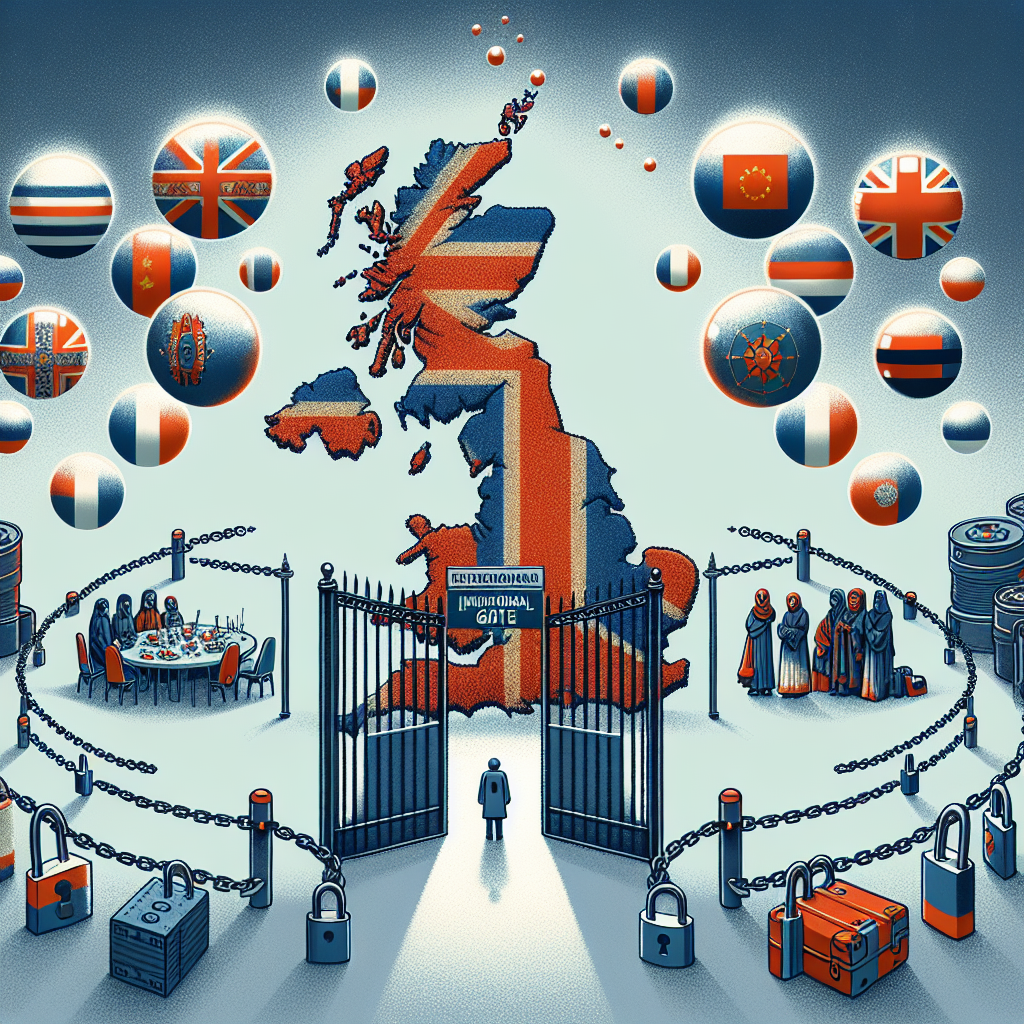
The Future of Immigration Policy in Post-Brexit Britain
In the wake of Brexit, Britain has been navigating a complex landscape of immigration policy that has transformed the country’s approach to foreign workers and residents. As we move further into 2025, the future of immigration policy in post-Brexit Britain continues to be a hotly debated topic, influenced by economic needs, public sentiment, and international relations. With the world witnessing significant geopolitical changes, it is crucial to examine how Britain’s immigration framework is evolving and what it means for both the economy and the society at large.
Understanding Post-Brexit Immigration Frameworks
The post-Brexit immigration policy represents a significant shift from the free movement principles that characterized the UK’s membership in the European Union. The introduction of the points-based immigration system established in January 2021 has aimed to attract skilled workers while limiting low-skilled immigration. This framework evaluates prospective immigrants based on their qualifications, job offers, and language proficiency, among other criteria. The intention is to create a robust workforce that aligns with the country’s economic priorities, addressing shortages in sectors like healthcare, technology, and engineering.
However, the implementation of this new system has sparked debates about its effectiveness and inclusivity. Critics argue that the stringent requirements may exclude essential workers, particularly from sectors reliant on low-skilled labor, such as agriculture and hospitality. As the UK economy grapples with these labor shortages, policymakers are increasingly reassessing the balance between attracting high-skilled immigrants and ensuring that vital industries maintain adequate workforce levels. This ongoing discussion will shape the future of immigration policy and its reception among British citizens.
The Economic Imperative for Immigration
The link between immigration and economic growth in post-Brexit Britain cannot be overstated. A study conducted by the Institute for Public Policy Research (IPPR) revealed that immigration significantly contributes to the UK’s GDP and supports innovation across various sectors. In 2025, as the economy continues to recover from the impact of COVID-19, the demand for foreign talent remains high, particularly in technology and healthcare. The future of immigration policy must, therefore, strike a delicate balance between meeting labor demands and preserving public interest.
Moreover, the aging population in the UK exacerbates the need for a sustainable workforce. With a growing percentage of the population reaching retirement age, industries will increasingly rely on a younger, diverse workforce to fill essential roles. Immigration policy must not only facilitate the entry of skilled professionals but also consider pathways for integration and community-building among immigrants. This is crucial for ensuring that newcomers not only contribute economically but also enrich the cultural fabric of the nation.
Cultural Integration and Social Cohesion
One of the major challenges facing Britain’s immigration policy is fostering cultural integration and social cohesion within diverse communities. In 2025, the UK is more multicultural than ever, with individuals from various backgrounds contributing to society. The success of any immigration policy relies heavily on how well these individuals are integrated into British society. Educational and social programs are essential to help immigrants navigate cultural norms, acquire language skills, and build connections within their new communities.
To enhance social cohesion, there have been calls for increased investment in public services that cater to diverse populations, including language and vocational training programs. Furthermore, legislation that promotes anti-discrimination and celebrates multiculturalism can help dispel negative perceptions surrounding immigration. The policy’s direction may pivot towards not only attracting skilled immigrants but also prioritizing their successful integration, promoting a more harmonious coexistence among the native population and immigrants alike.
Public sentiment plays a crucial role in shaping immigration policy. Surveys indicate that while a substantial segment of the British population acknowledges the economic benefits of immigration, there is also significant apprehension about its impact on local culture and job markets. Addressing these concerns through transparent policy discussions and public engagement initiatives can ease tensions and foster a more informed discourse on immigration issues.
Future Directions: Key Policies on the Horizon
As we look to the future, several key policies are emerging that will likely shape the trajectory of immigration in post-Brexit Britain. One area gaining traction is the introduction of sector-specific visas that address labor shortages in critical industries. For instance, the agricultural sector has already experienced severe disruption due to the end of free movement. As a result, the government may develop more flexible visa pathways that cater to seasonal and temporary labor needs.
Additionally, the government’s focus on attracting high-value talent must consider the importance of international collaborations, notably in research and innovation. Enhanced visa options for researchers and academics could facilitate the exchange of knowledge and collaboration across borders, bolstering the UK’s position as a global leader in various fields. These initiatives can play a vital role in maintaining the country’s competitive edge on the international stage.
Simultaneously, there is an increasing push for revisiting the criteria set out in the points-based system. Policymakers may need to adapt or lower thresholds in sectors facing acute skill shortages while ensuring that these changes do not compromise national interests. The balancing act between attracting necessary labor and safeguarding public services and social cohesion will undoubtedly remain a focal point in future policy discussions.
Challenges and Controversies in Immigration Reform
The road to a reformed immigration policy is fraught with challenges and controversies. One of the most significant issues is the perception of immigration amidst rising nationalism and xenophobia. Political rhetoric surrounding immigration often becomes polarizing, and in 2025, the public discourse needs to shift towards a more constructive and balanced narrative that emphasizes the benefits of diversity rather than solely focusing on its challenges.
Moreover, there are inherent complexities in managing public services and resources amidst increased immigration. The NHS and educational systems are pressured by both rising costs and higher demands for services, leading to debates on funding allocation and accessibility. For the government to gain public trust, it must demonstrate that immigration does not come at the expense of native citizens while efficiently managing the inflow of newcomers.
On the international front, Brexit has altered the UK’s relationship with Europe, impacting collaboration on immigration and border control. The future of the Common Travel Area with Ireland remains a hot topic, given its importance for facilitating movement between the two countries. Ensuring a pragmatic approach that respects both sovereignty and collective security measures will be crucial in shaping a cohesive strategy moving forward.
Conclusion
As we navigate the complexities of immigration policy in post-Brexit Britain, it is clear that the future will require a comprehensive, adaptable approach that aligns economic needs with society’s values. The framework established thus far offers a starting point, but continuous revisions will be necessary to address labor demands, promote integration, and respond to public sentiment. By fostering a positive narrative around immigration and focusing on collaborative discussions, Britain can shape a dynamic immigration policy that reflects its evolving identity.
FAQs
What are the main features of the points-based immigration system?
The points-based immigration system evaluates applicants based on criteria such as job offer, salary, skills, and English language proficiency. It aims to attract skilled workers while limiting low-skilled immigration.
How has Brexit impacted immigration from the European Union?
Brexit has ended the free movement of people from the EU to the UK, leading to new restrictions and a shift in how immigration is regulated, with a focus on attracting skilled labor through a points-based system.
What challenges does the UK face in integrating immigrants into society?
Challenges include public sentiment towards immigration, access to public services, and the need for effective language and vocational training programs to facilitate integration.
Are there any sector-specific visas in the UK?
Yes, the UK is exploring sector-specific visas to address labor shortages in critical industries, allowing for more flexible arrangements for seasonal or temporary work.
What role does public perception play in shaping immigration policy?
Public perception significantly influences immigration policy, affecting both legislative approaches and the political climate surrounding immigration discussions, often reflecting concerns about culture, jobs, and resources.
Democracy versus Autocracy: A Global Perspective
16. Dezember 2025The Impact of Sanctions on Global Trade Dynamics
16. Dezember 2025Geopolitical Tensions in the South China Sea
16. Dezember 2025
Leave a reply Antwort abbrechen
-
Climate Policy in the Spotlight as COP28 Approaches
8. Dezember 2025 -
A Game of Milliseconds: Deciding Plays That Shaped the Outcome
7. Dezember 2025 -
Enhancing Public Safety: Bipartisan Strategies for Safer Communities
2. Dezember 2025





